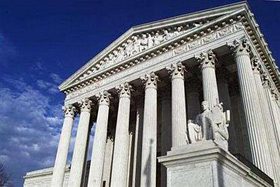 |
 |
 |
 News from Around the Americas | March 2006 News from Around the Americas | March 2006  
US Supreme Court Backs Abortion Protesters
 Toni Locy - Associated Press Toni Locy - Associated Press


| | The Supreme Court sided with anti-abortion groups in a 20-year-old lawsuit by ruling on Tuesday that federal law did not cover the physical violence by protesters cited in the shutdown of health clinics. (Reuters) |
Washington - The Supreme Court dealt a setback Tuesday to abortion clinics in a two-decade-old legal fight over anti-abortion protests, ruling that federal extortion and racketeering laws cannot be used to ban demonstrations.

The 8-0 decision ends a case that the 7th US Circuit Court of Appeals had kept alive despite a 2003 ruling by the high court that lifted a nationwide injunction on anti-abortion groups led by Joseph Scheidler and others.

Anti-abortion groups brought the appeal after the appellate court sought to determine whether the injunction could be supported by charges that protesters had made threats of violence.

In Tuesday's ruling, Justice Stephen Breyer said Congress did not intend to create "a freestanding physical violence offense" in the federal extortion law known as the Hobbs Act.

Instead, Breyer wrote, Congress chose to address violence outside abortion clinics in 1994 by passing the Freedom of Access to Clinic Entrances Act, which set parameters for such protests.

Social activists and the AFL-CIO had sided with abortion demonstrators in arguing that lawsuits and injunctions based on the federal extortion law could be used to thwart their efforts to change public policy or agitate for better wages and working conditions.

The legal battle began in 1986, when the National Organization for Women filed a class-action suit challenging tactics used by the Pro-Life Action Network to block women from entering abortion clinics.

NOW's legal strategy was novel at the time, relying on civil provisions of the 1970 Racketeer Influenced and Corrupt Organizations Act, which was used predominantly in criminal cases against organized crime. The lawsuit also relied on the Hobbs Act, a 55-year-old law banning extortion.

A federal judge issued a nationwide injunction against the anti-abortion protesters after a Chicago jury found in 1998 that demonstrators had engaged in a pattern of racketeering by interfering with clinic operations, menacing doctors, assaulting patients and damaging clinic property.

But the Supreme Court voided the injunction in 2003, ruling that the extortion law could not be used against the protesters because they had not illegally "obtained property" from women seeking to enter clinics to receive abortions.

Justice Samuel Alito did not participate in the decision.

The cases are Scheidler v. NOW, 04-1244, and Operation Rescue v. NOW, 04-1352. | 
 | |
 |



